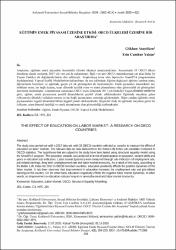| dc.contributor.author | Ataştöken, Gökhan | |
| dc.contributor.author | Yalçın, Esin Cumhur | |
| dc.date.accessioned | 2021-12-12T22:01:53Z | |
| dc.date.available | 2021-12-12T22:01:53Z | |
| dc.date.issued | 2020 | |
| dc.identifier.issn | 2602-4314 | |
| dc.identifier.uri | https://doi.org/10.47140/kusbder.771086 | |
| dc.identifier.uri | https://dergipark.org.tr/tr/pub/kusbder/issue/59055/771086 | |
| dc.identifier.uri | https://dergipark.org.tr/tr/download/article-file/1207199 | |
| dc.identifier.uri | https://hdl.handle.net/20.500.11857/4288 | |
| dc.description | DergiPark: 771086 | en_US |
| dc.description | kusbder | en_US |
| dc.description.abstract | Araştırma, eğitimin emek piyasaları üzerindeki etkisini ölçmeyi amaçlamaktadır. Araştırmada 35 OECD ülkesi örneklem olarak seçilerek, 2017 yılı veri seti ile çalışılmıştır. İlgili veri seti OECD istatistiklerinde yer alan Daha İyi Yaşam Endeksi alt değişkenlerinden elde edilmiştir. Araştırmaya konu olan hipotezler SmartPLS programından faydalanılarak Yapısal Eşitlik Modellerinin kullanılması ile test edilmiştir. Eğitim değişkeni eğitime katılma oranı, öğrencilerin becerileri ve eğitimde geçen yıl alt göstergeleri ile incelenmiştir. Emek piyasaları dinamikleri ise; istihdam oranı, işe bağlı kazanç, uzun dönemli işsizlik oranı ve emek piyasalarına olan güvensizlik alt göstergeleri üzerinden ölçülmüştür. Araştırmanın sonucunda OECD üyesi ülkelerde 2017 yılı Daha İyi Yaşam Endeksi verilerine göre; eğitim, emek piyasasının pozitif dinamiklerini pozitif yönde etkilemektedir. Eğitimde meydana gelen iyileşmenin ülkedeki istihdam oranını ve işe bağlı kazançlarını arttırdığı gözlenmiştir. Diğer yandan eğitimin emek piyasasındaki negatif dinamiklerini ise negatif yönde etkilemektedir. Başka bir ifade ile eğitimde meydana gelen bir iyileşme, uzun dönemli işsizliği ve emek piyasalarına olan güvensizliği azaltmaktadır. | en_US |
| dc.description.abstract | The study was carried out with a 2017 data set, with 35 OECD countries selected as samples to measure the effect of education on labor markets. The relevant data set was derived from the Better Life Index sub-variables contained in OECD statistics. The hypotheses that are subject to the study have been tested using structural equality model using the SmartPLS program. The education variable was analyzed in terms of participation in education, student skills and years in education sub-indicators. Labor market dynamics were measured through sub-indicators of employment rate, job-related earnings, long-term unemployment rate and labor market insecurity. As a result of the study, according to the Better Life Index for 2017 in OECD member countries, education positively effects the positive dynamics of the labor market. It has been observed that improvement in education increases the employment rate and job-related earnings in the country. On the other hand, education negatively effects the negative labor market dynamics. In other words, an improvement in education reduces long-term unemployment and labor market insecurity. | en_US |
| dc.language.iso | tur | en_US |
| dc.publisher | Kırklareli Üniversitesi | en_US |
| dc.relation.ispartof | Kırklareli Üniversitesi Sosyal Bilimler Dergisi | en_US |
| dc.identifier.doi | 10.47140/kusbder.771086 | |
| dc.rights | info:eu-repo/semantics/openAccess | en_US |
| dc.subject | Eğitim | en_US |
| dc.subject | Emek Piyasası | en_US |
| dc.subject | OECD | en_US |
| dc.subject | Yapısal Eşitlik Modellemesi | en_US |
| dc.subject | Education | en_US |
| dc.subject | Labor Market | en_US |
| dc.subject | OECD | en_US |
| dc.subject | Structural Equality Modeling | en_US |
| dc.title | EĞİTİMİN EMEK PİYASASI ÜZERİNE ETKİSİ: OECD ÜLKELERİ ÜZERİNE BİR ARAŞTIRMA | en_US |
| dc.title.alternative | THE EFFECT OF EDUCATION ON LABOR MARKET: A RESEARCH ON OECD COUNTRIES | en_US |
| dc.type | article | |
| dc.department | Fakülteler, İktisadi ve İdari Bilimler Fakültesi, Ekonometri Bölümü | |
| dc.identifier.volume | 4 | en_US |
| dc.identifier.startpage | 204 | en_US |
| dc.identifier.issue | 2 | en_US |
| dc.identifier.endpage | 220 | en_US |
| dc.relation.publicationcategory | Makale - Ulusal Hakemli Dergi - Kurum Öğretim Elemanı | en_US |



















